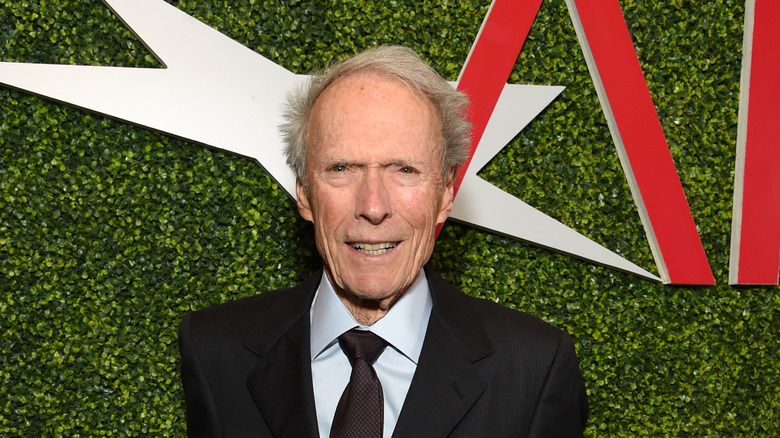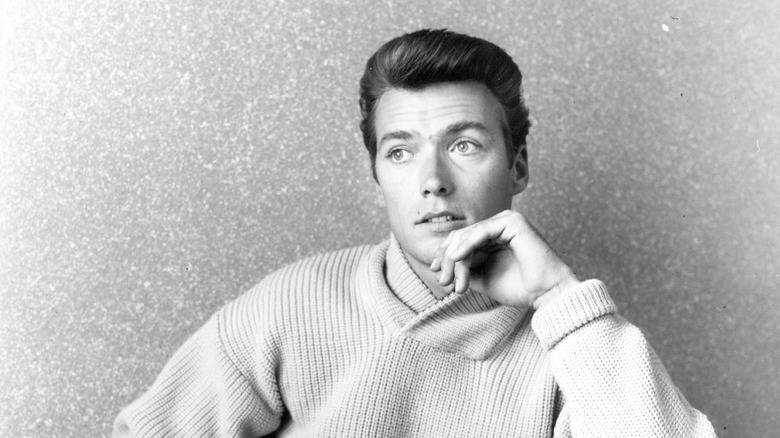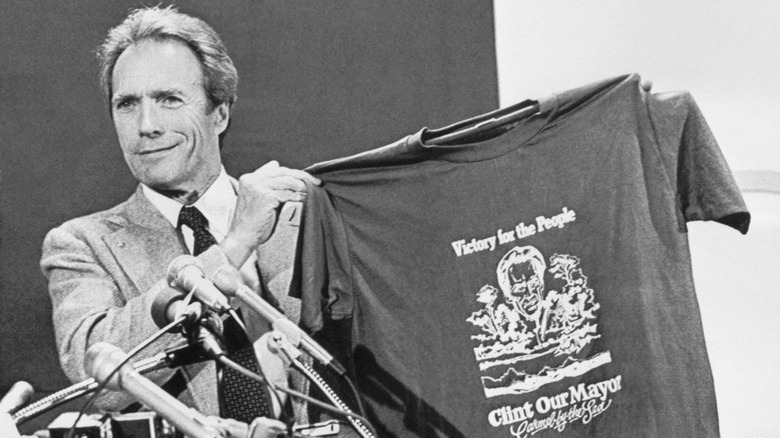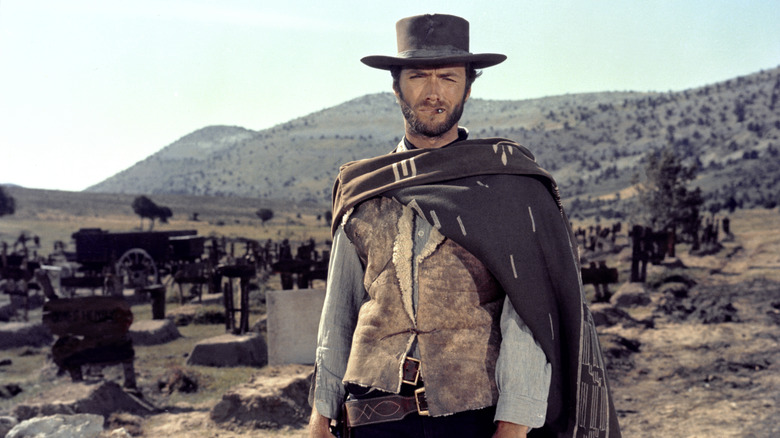Strange Details About Clint Eastwood That Everyone Ignores
Clint Eastwood has been a Hollywood star since the late 1950s, an icon of the Western genre as well as one of its greatest innovators, and one of the most respected figures in the industry. Having worked countless menial jobs and having a stint in the U.S. Army — where he worked, surprisingly, as a swimming instructor as well as, more unsurprisingly, a bouncer — Eastwood worked his way into acting, making his name in the hit Western TV show "Rawhide." Since then, he has rarely stopped, delivering among his sprawling filmography timeless classics like "A Fistful of Dollars," "The Good, the Bad and the Ugly," "The Unforgiven," with Eastwood proving his chops time and again both as an actor and an ambitious director.
Still working prolifically in his 90s, Eastwood enjoys a devoted fanbase of viewers of all ages, with both his Western classics as well as more recent hits including 2008's "Gran Torino" and 2015's "American Sniper" — which was the highest-grossing movie of his career — ensuring he is still a heavy hitter. But is there anything fans don't know about him after seven decades of stardom? Is he really the macho man's man that he's stereotyped as? Here are some of the strange facts about his life and career that may surprise you.
Eastwood's looks and voice at one time hindered his career
Clint Eastwood's Western oeuvre is encapsulated in a single image: the actor sporting a wide-brimmed fedora, hand at the waist ready to draw his pistol, a cigar in the corner of his mouth. Eastwood was celebrated as an attractive, masculine leading man, whose characteristic squint — a look of disdain as his characters face down whatever challenges they may encounter — has been his trademark since the very early days of his career.
But it is surprising to learn that when Eastwood was starting out not everyone was convinced that his striking looks were suitable for a career on screen. Way back in 1959, Eastwood was rejected by Universal Studios, who were concerned that his Adam's apple was too prominent and that he had a chipped tooth. The executives also had an issue with Eastwood's slow drawl — another aspect of his acting that would become famous later in his career.
Eastwood was let go at the same time as another movie icon: Burt Reynolds, a frequent future collaborator who was told by the studio that he lacked acting talent. According to legend, Reynolds was amused by their being released by the studio, joking with Eastwood that he could get acting lessons, while Eastwood was stuck with his looks, per the Los Angeles Times.
Clint's forgotten music career
It is quite well-known that Eastwood has contributed music to several of his films. He has also composed the scores for several of his movies, including "Mystic River," "Flags of Our Fathers," and "Changeling," while for his 2008 hit "Gran Torino," Eastwood actually sings part of the theme music. His love of music has come through, too, in the subjects of some of his films, including 1988's "Bird," his biopic of jazz legend Charlie Parker, and his 2003 documentary "Piano Blues."
But what is less known to modern audiences is that Eastwood attempted to forge a career as a singer himself. Just after "Rawhide" catapulted the young actor to nationwide fame, he decided to capitalize with a Country and Western album, "Rawhide's Clint Eastwood Sings Cowboy Favorites," which was moderately successful. He also released a spate of singles, with his singing career arguably peaking with the duets "Bar Room Buddies" with Merle Haggard, which hit No. 1 on the Hot Country Singles chart, and "Beers to You" with Ray Charles, both released in 1980. Eastwood has even written several songs for other artists, including Diana Krall and Jamie Cullum, per American Songwriter.
He was the mayor of a small town
Not content to busy himself in the worlds of acting and music, Clint Eastwood also found time during his long career to dabble in local politics. In 1986, he ran for the mayorship of the tiny town of Carmel, California, which had been his home for many years, campaigning on the promise to lift a ban on ice cream cones, to ban skateboarding, and several other issues facing himself and locals. Surprisingly, the actor won by a landslide, and for the next two years was mayor of the town, attending regular City Council meetings. The story of Eastwood's success was such that he was approached by Vice-President George Bush to be his running mate for the presidential election in 1988, according to the book "Clint Eastwood" by Minty Clinch, though the actor decided to return to the film industry after his two-year mayorship.
Clint Eastwood's political views have come under scrutiny throughout his career, with fans keen to know whether he considers himself liberal or conservative, and which candidate he endorses during presidential elections. Typically, Eastwood has attempted to avoid being aligned with either major party, though he has frequently referred to himself as a libertarian.
He's dedicated to meditation
Clint Eastwood has always been cool as a cucumber on screen, as well as generally well-grounded in interviews throughout his career. Much of his allure undoubtedly derives from his frequent portrayals of characters keeping their cool under pressure. But what few people know is that Eastwood's easy calm has a spiritual dimension: he meditates and has done for more than half his life.
In particular, the "Dirty Harry" actor is a proponent of transcendental meditation, also known as TM. TM has long been used as a therapeutic activity used to limit distraction and relax the mind. It's famous adherents include The Beatles and experimental filmmaker David Lynch, who has campaigned for the technique's use in combating post-traumatic stress disorder (PTSD) among American veterans. "I'm a great supporter of transcendental meditation. I've been using it for almost 40 years now. I think it's a great tool for anyone to have," Eastwood said in a video interview for the David Lynch Foundation's YouTube channel, adding he believes it could certainly benefit veterans in relieving stress.
He never washed his poncho
If "Rawhide" made Clint Eastwood famous, then Sergio Leone's "The Dollars Trilogy," made up of "A Fistful of Dollars," "For a Few Dollars More," and "The Good, the Bad and the Ugly" made him a megastar. Portraying the "Man with No Name," a quickdraw expert with a steel-cold gaze, Eastwood's outfit, a wide-brimmed fedora with an alpha poncho, which to this day is still taken as inspiration for men's fashion by outlets such as GQ.
Eastwood wore the same iconic poncho in all three "Dollars" films, and, despite weeks of filming in the dust and heat to make the trilogy, it was never washed in between takes, or even between movies, for fear that it would damage the garment. Clintwood still owns the poncho to this day, though he told Entertainment Today in the 2000s: "It was folded up after 'The Good, the Bad and the Ugly' and it hasn't been unfolded yet." More recently, he has claimed the poncho is protected by glass, and it still remains unwashed (via The Daily Mail).



